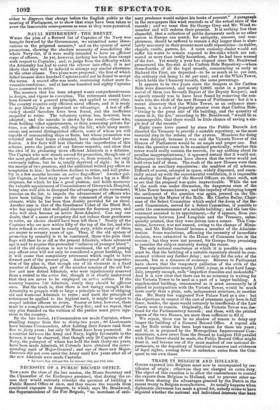NAVAL RETIREMENT : THE BREVET.
WHEN the plan of a Retired list of Captains of the Navy was brought forward by the Government, we submitted some obser- vations on the proposed measure,* and on the system of naval promotions, showing the absolute necessity of remodelling the whole Navy-list, if it were really intended to have an efficient corps of officers. As yet, however, nothing has been done except with respect to Captains; and, to judge from the difficulty which the Admiralty has had to carry the scheme into effect, it is not likely that they will be induced to attempt any similar alteration in the other classes. Two plans were proposed; the first of which failed because three hundred Captains could not be found to accept the terms. A second offer was made, containing rather more fa- vourable conditions ; and at last one hundred and eighty Captains have consented to retire. -
The measure that has been adopted wants comprehensiveness in design, and vigour in execution. The retirement should have been formed on a general principle, and applied to every class. The country requires only efficient naval officers, and it is ready to pay liberally for so important an advantage. A test of effi- ciency should therefore have been found, and the inefficient compelled to retire. The voluntary system has, however, been adopted ; and the mistake is shown by the result,—those who, from holding other appointments, or from possessing private for- tune, can afford to remain, still clog the list ; while many merit- orious and several distinguished officers, some of whom are still capable of commanding ships or fleets, but whose promotion was retarded and their hopes exhausted, have abandoned their pro- fession. A few facts will best illustrate the imperfection of this scheme, prove the justice of our former remarks, and show that the idea of its producing more efficient Admirals is a delusion. The Captain who now stands second for promotion, though one of the most gallant officers in the service, is, from wounds, not only
extremely infirm, but he totally deprived of sight : he is in the receipt of two pensions, and the additional retired pay offers no temptation to him : he therefore declines to retire, and will proba- bly in a few months become an active flag-officer ! Another gal- lant Captain, at least sixty years of age, who lost a leg as a Mid- shipman, for which he has a good pension, and holds moreover the valuable appointment of Commissioner of Greenwich Hospital, being also well able to disregard the advantages of the retirement, remains on the list, to impede the advancement of officers who have been toiling for years in the command of ships in every climate, while he has been thus doubly provided for on shore. Another case is that of the Gentleman Usher of the Black Rod, who has enjoyed that well-paid sinecure for fourteen years, and who will soon become an active Rear-Admiral. Can any one doubt, that if a sense of propriety did not induce these gentlemen to retire, no choice should have been left them ? Nearly all the Captains who are now within fifty of the top of the list, and who have refused to retire, must be nearly sixty, while many of them are nearer to seventy years of age. Thus, if the old system of promotion by seniority is to be continued, those who gain their flags will then be as old as the present Admirals, whose advanced age is said to require this pretended "infusion of younger blood"; and if the old system is not to be continued, the act of passing any officer over will not only be considered a great hardship, but it will cause that compulsory retirement which ought to have formed part of the present plan. Another proof of the imperfec- tion of the plan is, that though one of its elements is a fixed number of Admirals, part of the number consists of the old Yel- low and now dotted Admirals, who were injudiciously removed from a retired to the active list, though it is clearly understood that they are never to be employed on active service. If the country requires 150 Admirals, surely they should be efficient ones. But the truth is, that there is not energy enough in the Admiralty to grapple with so large a principle as that of obliging old and worn-out Admirals to retire ; and until the principle of retirement be applied to the highest rank, it might be unjust to compel inferior officers to retire. Sooner or later, however, there must be a complete revision of the Navy-list ; and we repeat, that any plan founded on the volition of the parties must prove inju- rious to the country. By the late brevet, 44 Commanders are made Captains, whose standing ranges from five to thirty -tam years ; 80 Lieutenants have become Commanders, after holding their former rank from five to forty years; but only 20 Mates have been promoted. As a contrast between the Army and Navy, highly favourable to the former, it may be observed, that though only 20 Captains of the Navy, the youngest of whom has held the rank thirty-six years, have been made Admirals, 81 Colonels have obtained the corre- sponding rank of Major-General ; and one of these new Major- Generals did not even enter the Army until five years after all of the new Admirals were made Captains.
• Spectator, Nue. 903 and 904, for October 18th and 25th 1845.


























 Previous page
Previous page